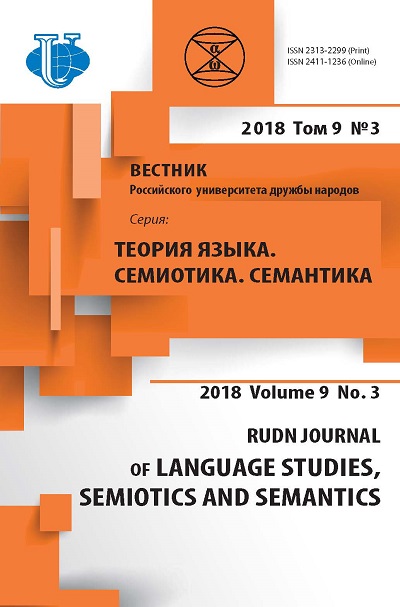A LINGUISTIC COMPARATIVE ANALYSIS OF THE SPEECHES OF THE PRESIDENT OF RUSSIA VLADIMIR PUTIN AND THE 44-TH PRESIDENT BARACK OBAMA DELIVERED THE HEADS OF THE RUSSIAN FEDERATION AND THE UNITED STATES AT THE 70-TH MANAGING ASSEMBLY OF THE UN IN 2015
- Authors: Chichina M.O1
-
Affiliations:
- Moscow state Institute of international relations (University) MFA of Russia
- Issue: Vol 9, No 3 (2018)
- Pages: 640-650
- Section: FUNCTIONAL SEMANTICS
- URL: https://journals.rudn.ru/semiotics-semantics/article/view/19430
- DOI: https://doi.org/10.22363/2313-2299-2018-9-3-640-650
- ID: 19430
Cite item
Full Text
Abstract
The purpose of the article is the conduction a linguistic comparative analysis of the speeches of the President of Russia V.V. Putin and the 44th US President Barack Obama, delivered by these leaders at the jubilee 70th UN General Assembly. The author of the article uses the method of system linguistic analysis, which involves study of the semantic structure of texts, the analysis of vocabulary and rhetoric techniques used by President of Russia V.V. Putin and the 44th US President, Barack Obama. The speech of the state leader being a special type of the political discourse apart from the linguistic realizations of the linguistic personality of a particular person also reflects the basic principles of the mindset of the people and reveals its attitude to history and current political situation. The basis for carrying out of the comparative analysis was the general theme of the speeches by V.V. Putin and B. Obama - the 70th anniversary of the United Nations Organization - an important international event. Each word of the leaders of such states as Russia and the USA pronounced from the high tribune of the UNO is meaningful, therefore analyzing of those meanings that are hidden behind the use of appeals, metaphors, comparisons, and constructions of pronouns ‘we/I’ is a matter of particular interest.
About the authors
Marina O Chichina
Moscow state Institute of international relations (University) MFA of Russia
Author for correspondence.
Email: mch2629@yandex.ru
Doctor of Philology, Associate Professor, Associate Professor of the Russian Language Department for Foreign Students of the Moscow State Institute of International Relations (University) of the Ministry of Foreign Affairs of the Russian Federation (MGIMO (U)); scientific interests: comparative linguistics, linguoculturology, discourse theory, text theory
76, Prospekt Vernadskogo, Moscow, Russia, 119454References
- The speech of the President of the Russian Federation Vladimir Vladimirovich Putin (fragments of the speech are quoted in the text posted on the Kremlin’s official website. URL: http://www.kremlin.ru/events/president/news/50385. (accessed: 09.05.2018).
- The speech of the 44th US President Barack Obama in Russian (fragments of speech are quoted in the text posted on the site. URL: https://inosmi.ru/world/20150930/230544021.html. (accessed: 03.05.2018).
- The speech of the 44th US President Barack Obama in English (fragments of speech are quoted in the text posted on URL: AmericanRhetoric.com., Barack Obama 70th Session of the United Nations General Assembly Address. (accessed: 07.05.2018).
- Demyankov, V.Z. (2001). The interpretation of the political discourse in media. In Mass media as an object of the interdisciplinary research. Moscow: Moscow State University.
- Vodak, Ruth (1997). Language. Discourse. Politics. Volgograd: Peremena.
- Chernyavskaya, V.E. (2006). The discourse of Power and the Power of Discourse: Problems of Speech Effects. Moscow, Flint: Science.
- Larson, S.U. (1995). Persuasion: reception and resposibility. Belmot: Wadsnorth Publ. Company.
- Urazgalieva, O.A. The verbalization of the communicative strategy of cooperation in political discourse (on the example of V.V. Putin at the 70th UN General Assembly). URL: http://journals.uspu.ru/attachments/article/1619/13.pdf. (accessed: 09.05.2018).
- Parshina, O.N. URL: https://new-disser.ru/_avtoreferats/01002882356.pdf. (accessed: 15.04.2018).
Supplementary files












